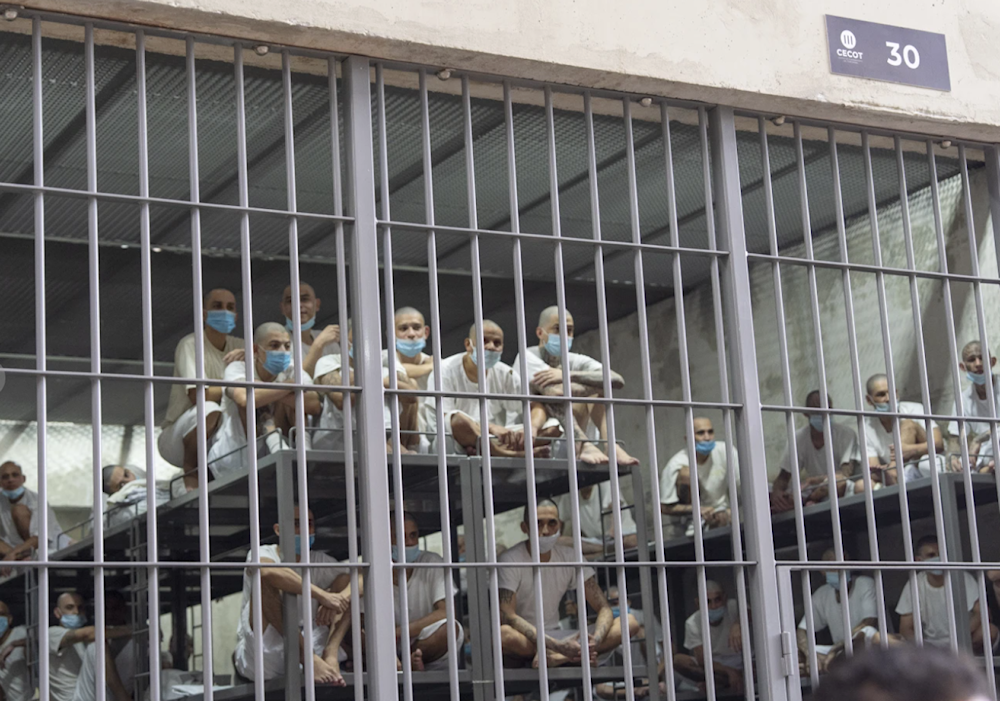US deports 100,000 people, arrests 113,000 since Trump's inauguration
According to experts from the non-profit American Immigration Council, Mexico is the biggest source of migrants to the United States, accounting for 22.8% of the total.
-

Prisoners look out of their cells as Homeland Security Secretary Kristi Noem tours the Terrorist Confinement Center in Tecoluca, El Salvador, on March 26, 2025 (AP)
The US Immigration and Customs Enforcement (ICE) has deported over 100,000 individuals since President Donald Trump took office, the New York Post reported, citing an ICE source.
Additionally, ICE officials have carried out 113,000 arrests since Trump's inauguration, the newspaper said in a report published on Monday.
The number of unlawful border crossings in March decreased to a historic low of 7,000, with the bulk taking place in the San Diego and El Paso border sectors. Most irregular migrants are reportedly being transferred to Mexico.
Trump promised in his inaugural speech on January 20 to immediately stop the flow of undocumented migrants entering the US and to begin the process of deporting millions of them back to their home countries. Trump also proclaimed a national emergency in response to the southern border problem.
According to experts from the non-profit American Immigration Council, Mexico is the biggest source of migrants to the United States, accounting for 22.8% of the total. India comes in second with 6.1%, followed by China with 4.6%.
Last week, the administration halted certain green card applications, possibly affecting thousands of people who arrived in the United States as refugees or asylum seekers.
National Immigrant Justice Center Director of Policy Azadeh Erfani told Newsweek on Tuesday that two executive orders signed by President Donald Trump caused the halt.
Between October 2023 and September 2024, asylum seekers filed at least 67,800 green card applications, while over 40,000 were submitted by refugees, who can only apply if they arrived at least a year earlier.
Many refugees and asylum seekers come to the US fleeing conflict, unstable governments, or natural disasters. Despite Trump's criticism of the previous administration's immigration procedures, refugees undergo extensive vetting, including medical exams and interviews. The suspension of green card applications and the elimination of programs like humanitarian parole for certain nationalities may lead to deportation or detention for those who entered under these programs.
The Trump administration has faced court challenges over the elimination of refugee and parole programs as this continues to enhance immigration enforcement and scrutiny of green card and visa applications, including an investigation into social media remarks.
Trump administration weighs travel ban on 43 countries: Report
The Trump administration is also weighing new travel restrictions on citizens from 43 countries as part of its latest immigration crackdown, which began at the start of the president’s second term.
According to an internal memo seen by Reuters, the affected nations are categorized into three groups. The first group, which includes Afghanistan, Iran, Syria, Cuba, and the DPRK, would face a full visa suspension.
A second group, comprising Eritrea, Haiti, Laos, Myanmar, and South Sudan, would see partial suspensions impacting tourist, student, and some immigrant visas, though certain exceptions would apply.
The third group includes 26 nations, such as Pakistan, Belarus, and Turkmenistan, which would face a partial suspension of visa issuance unless their governments address "deficiencies" within 60 days.
A US official, speaking anonymously, indicated that the list could change and has yet to receive final approval from the administration, including Secretary of State Marco Rubio.
The order required cabinet members to recommend by March 21 which countries should face full or partial travel restrictions due to "deficient vetting and screening information."
In October 2023, Trump pledged to block entry from Gaza, Libya, Somalia, Syria, Yemen, and "anywhere else that threatens our security."
This move echoes Trump’s 2017 travel ban on seven majority-Muslim nations, a policy that was challenged in court but ultimately upheld by the Supreme Court in 2018.

 4 Min Read
4 Min Read








